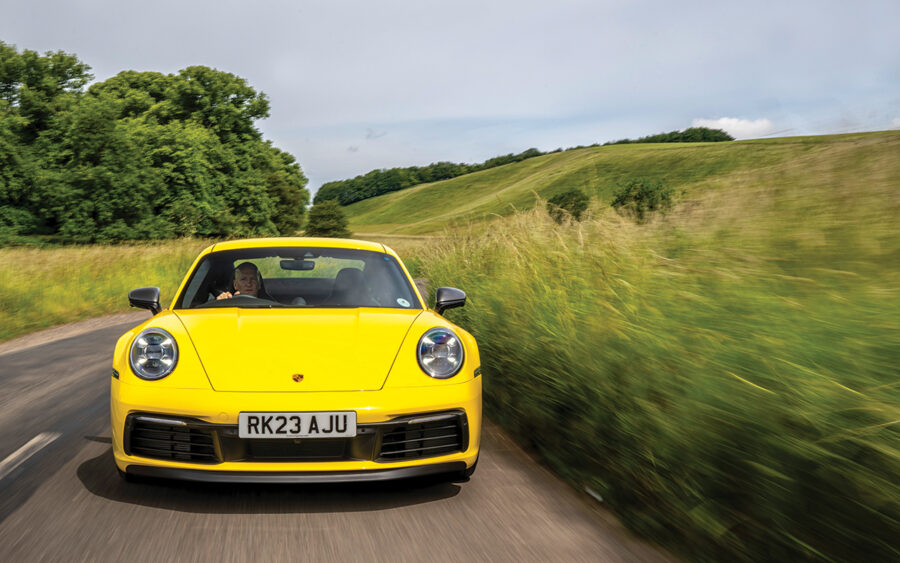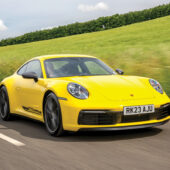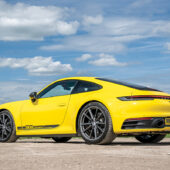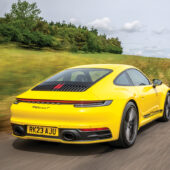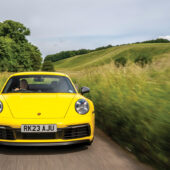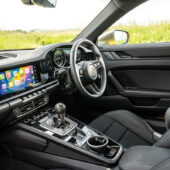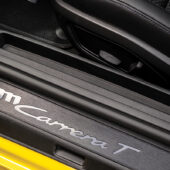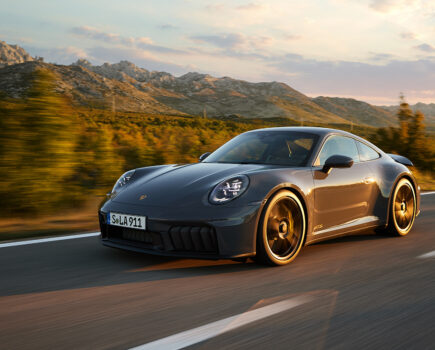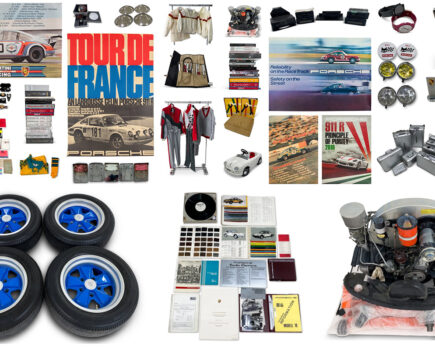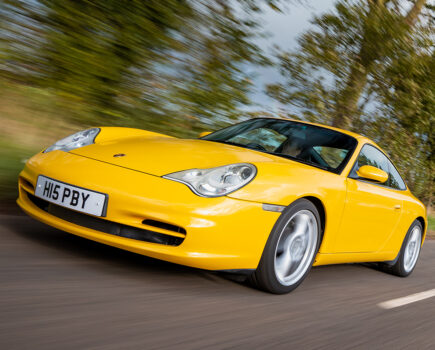The Carrera T recipe has been refined for the 992-generation 911, with fantastic results. We get behind the wheel
Words: James Fossdyke Images: Barry Hayden
Offer most 911 purists a lighter, pared-back, rear-drive Carrera with a manual gearbox and they’ll snap your hand off. This is exactly what Porsche is banking on with the new Carrera T.
As was the case with the widely celebrated 991 Carrera T, the 992 version is a more focused version of the standard Carrera, with some of the base model’s weight stripped out and a manual gearbox dropped in to make for a more involving drive. This very recipe made the earlier Carrera T one of the highlights of the 991 line-up. Porsche will be hoping the newer, more refined Carrera T will be equally appealing.
As before, the basic idea is pretty simple: the 911 Carrera is a quick car, so rather than adding power to the already fairly rapid equation, why not just bring what’s there into even sharper focus? As a result, and with an unladen weight of 1,470kg, the new Carrera T is thirty-five kilograms lighter than the basic Carrera and just twenty kilos heavier than the new GT3 RS.
In the main, the drop in weight is down to the switch to a seven-speed manual gearbox, which replaces the PDK semi-automatic transmission fitted to the entry-level Carrera. There are other contributing factors to the ridding of bulk. For one, the back seats have been removed. Porsche has also fitted lighter glass and left some of the Carrera’s soundproofing material on the factory floor. Thankfully, what we have here isn’t a wholesale strip-out. Indeed, the new Carrera T feels more luxurious than its predecessor, which went down the route of fabric door pulls, among other exercises in lightweighting. By contrast, the 992 Carrera T is trying to offer all the equipment of the stock Carrera, but attempts to do so while shedding a bit of timber.
Porsche has made a few visual tweaks, too, just to make sure those in the know are aware this isn’t a common or garden 911. At the front, you get twenty-inch alloys, while the rears measure twenty-one inches in diameter. All four rims are painted Titanium Grey. The grey theme is mirrored elsewhere, with grey logos on the lower doors and grey trim strips on the rear grille. To top it all off, the door mirror caps are painted Agate Grey, although the sports exhaust system outlets are finished in high-gloss black, which feels like a missed opportunity.
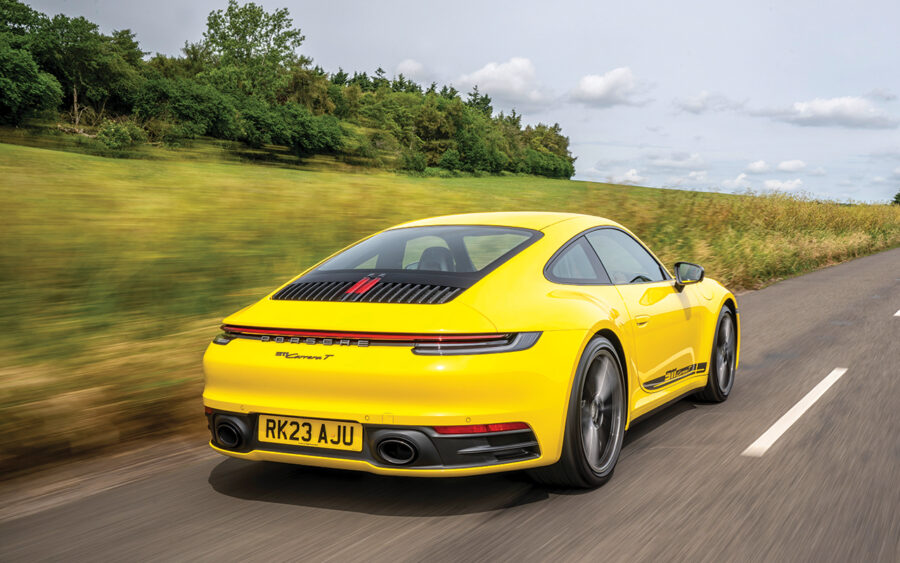
The Carrera T’s appearance is also subtly altered by Porsche Active Suspension Management (PASM), which is fitted as standard equipment. Dropping the ride height by ten millimetres might not sound especially drastic (because it isn’t), but it makes the car look a little more purposeful, as well as fulfilling the technical role of improving handling.
For all this, though, the Carrera T hasn’t changed a great deal. Of course, the 992-generation 911 brought its own upgrades. Alongside a late 991, it’s clearly a more modern machine, even if the older 911 has aged remarkably well. Nevertheless, the difference is the same no matter which version of the 992 you care to sample. Put it this way, when you park a 991 Carrera T next to a 992 Carrera T, which is something we did, it’s immediately apparent you’re looking at the same version of two different cars.
As it is, the new Carrera T gets the same basic interior as the stock 992, which comes with part-leather upholstery and black plastic door handles. In this respect, it feels a little bit drab, but the quality is impeccable. Of course, you can add individual equipment from Porsche’s options list, but to be perfectly honest, we have no real desire to focus on the interior. After all, what matters is the driving experience. This is supposed to be a 911 for purists, remember?!
What it isn’t, though, is an especially fast 911. No matter who is driving, the manual gearbox doesn’t shift as quickly as PDK, thereby limiting straight-line speed, even though the Carrera T is lighter than the standard 911. Whereas the PDK-only Carrera gets from rest to 62mph in 4.2 seconds, the Carrera T is three-tenths slower. A zero-to-62mph time of 4.5 seconds makes it anything but a slouch, and the 181mph top speed will be more than enough for most buyers, but if you want bragging rights, the new Carrera T might not be the car for you.
Nevertheless, with PASM and the manual gearbox at play, as well as Sport Chrono (standard kit) and a sports exhaust, the new Carrera T feels sharper and more aggressive than is predecessor. The old Carrera T was hardly soft, but the new model feels a cut above in every department.
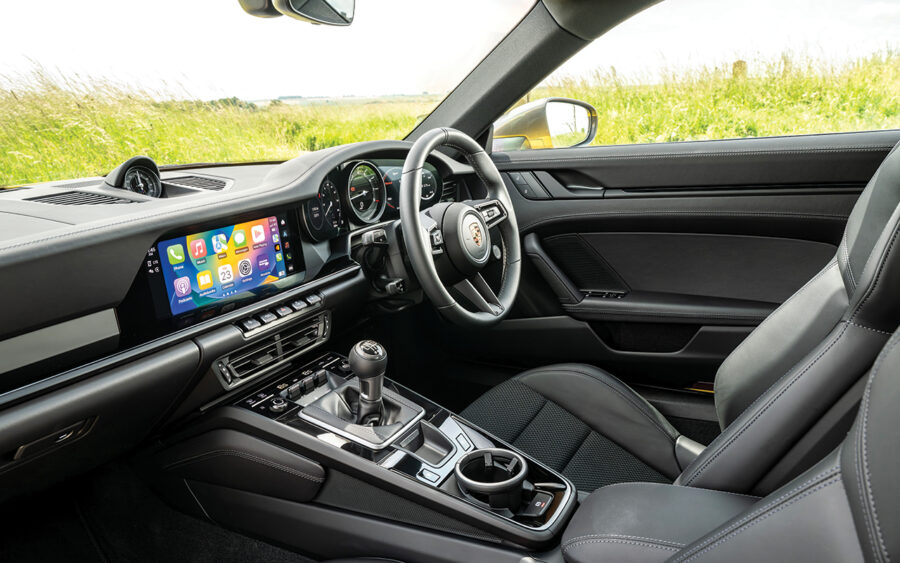
This is predominantly because of the tactility inherent in every modern 911, especially lighter models. Just as the 992 Carrera feels tighter and more engaged than the 991 Carrera, the new Carrera T is another step forward. You might not expect a thirty-five-kilo drop in weight to make much of a difference, but it makes this Porsche feel a fraction sharper and pointier than the base Carrera, with the slightly more responsive front end providing extra agility and liveliness.
The addition of PASM gives the new Carrera T more of an edge, particularly if you switch to a more aggressive suspension mode. This isn’t necessary most of the time — body control is always very good, and the ride is reasonably supple in the softer setting — but on a track, switching things up will provide more control and immediacy. As you might have guessed, doing so makes the ride arguably too firm for use around town, although it’s certainly more acceptable than that of the GTS. While the 992 Carrera T is less harsh than some of its siblings, however, it has taken a more hardcore route than the earlier 991 Carrera T. This is part of the trade-off for improving sharpness in the steering and the suspension, but it’s a price some buyers might prefer not to pay. Then again, if you’re buying a 911 to be comfortable, you probably won’t have much interest in a Carrera T anyway.
The other big difference between old and new Carrera Ts is the option of four-wheel steering for the 992 model. This isn’t available on the stock 992 Carrera. The system is designed to make the car more manoeuvrable — at low speed, the rear wheels turn slightly in the opposite direction to those at the front, but at higher speed, the wheels turn in the same direction, thereby improving stability. Without testing a 992 Carrera T lacking four-wheel steering — our test car was equipped with the £1,830 option — it’s hard to tell exactly how much difference it made, but it certainly makes the 911 feel wieldier around town. Parking is easier than it otherwise would be, and tight corners otherwise proving bit tricky are suddenly a little bit easier to navigate.
Due to the fact Porsche has, in part, reduced weight by removing soundproofing and by installing thinner glass, the 992 Carrera T follows its predecessor in feeling more visceral than the standard Carrera. The noise of the turbocharged flat-six feels a mite closer than it would in the base model, meaning you’re that bit more exposed to (and therefore more in tune with) the mechanical aspects of the 911. This is helped by the valved exhaust system, which comes with a louder, sportier setting, magnifying an already pleasing sound.
In truth, the difference is quite subtle — it doesn’t completely change the character of the boxer at the back, instead building on what’s already there to bring you closer to the action without introducing an antisocial soundtrack. It’s kind of old-school when compared with the rather luxurious Carrera, although it doesn’t go far enough to completely alienate those who primarily see a Porsche as a luxury accessory, rather than an out-and-out sports car. Nevertheless, the new Carrera T is more interested in sporting prowess than cross-country comfort.
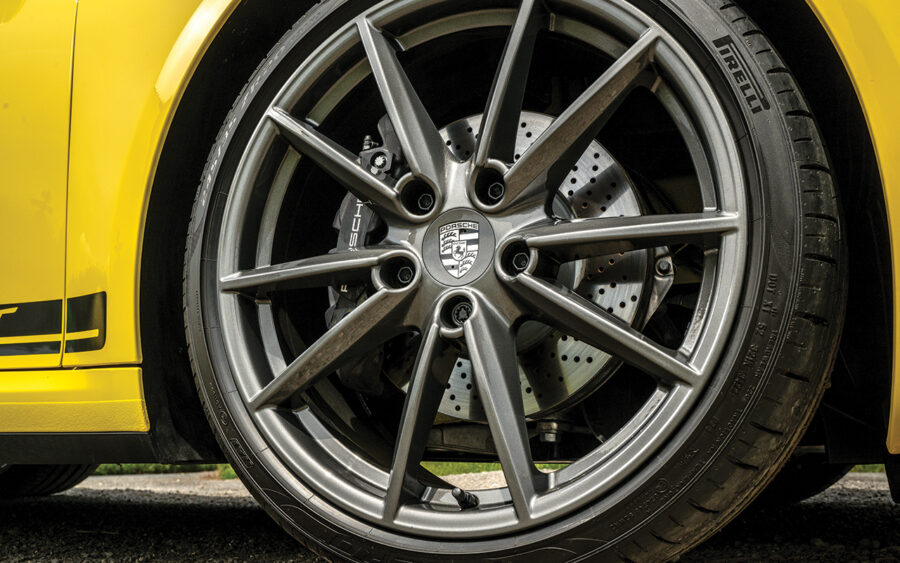
The combination of exhaust note, sharper suspension and more direct handling makes the new Carrera T feel even more involving than its predecessor, which was already an engaging machine. The drive is a more dramatic, but even without rear seats, this is a 911 you can use for commuting, long weekends away or blasts around a circuit on a track day. Admittedly, it probably won’t be the 911 you use for the school run — it’s too much of a toy for that — but this is a remarkably good all-rounder for a sports car with such a focus on performance. Certainly, it’s more useful than a GT3.
Pleasingly, the Carrera T remains one of the cheaper 911s available in dealer showrooms. To put this into perspective, a basic Carrera is yours for £97,000 on the nose, while the Carrera T costs £105,700, representing a premium of just £8,700. Given the Sport Chrono package is a £1,937 option for the Carrera, not to mention the fact the Carrera T brings you a stack of lightweighting measures to boot, the asking price seems perfectly reasonable. It looks even better when you consider the not insubstantial £122,000 you’ll need to find for a new GTS.
Then there’s the GT3, which runs perilously close to £150,000. Although the Carrera T may not be as quick around a race track, it’ll probably be just as much fun for the overwhelming majority of Porsche’s customers.
For our money, then, the new Carrera T is the yardstick by which all other track-oriented 911s should be measured. More supple than the GTS, cheaper than the GT3 and more aggressive and engaging than a Carrera, the Carrera T is the best-value offering among the most driver-focused models in the current 911 range. The same was true of the 991 Carrera T, but the new version is a noticeably more impressive car, bringing even more focus to the recipe without sacrificing, well, very much at all.
Sure, the 992 Carrera T might not be quite as comfortable as the earlier 991 Carrera T, but it’s close. It’s certainly good enough for a high-performance sports car designed to be a part-time track weapon. And with an agreeable price tag, the new Carrera T is just about the perfect 911 for those most enthralled with the breed.

